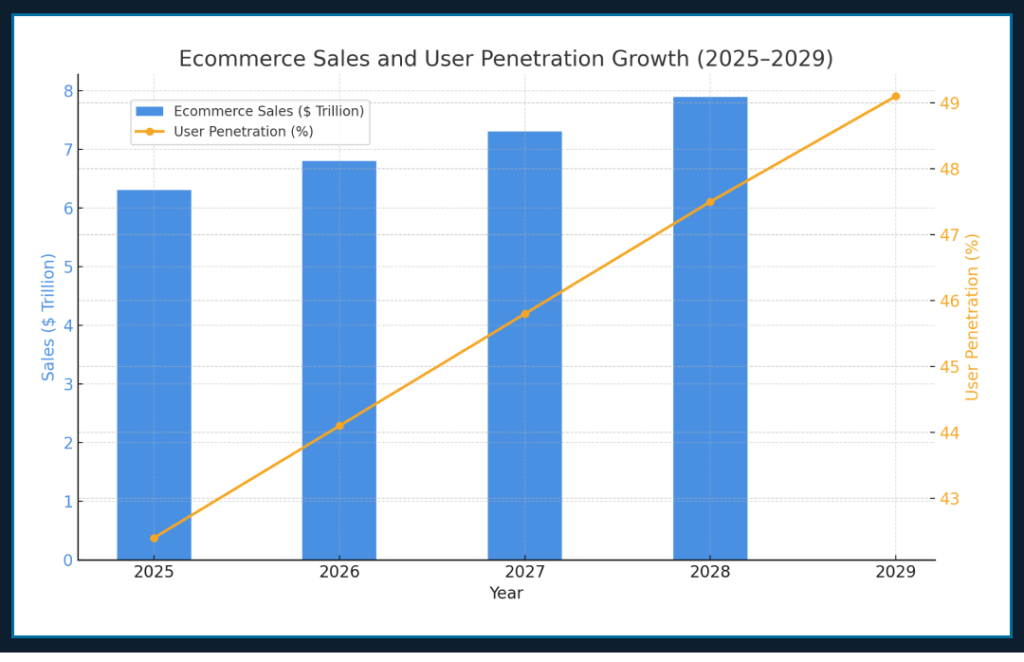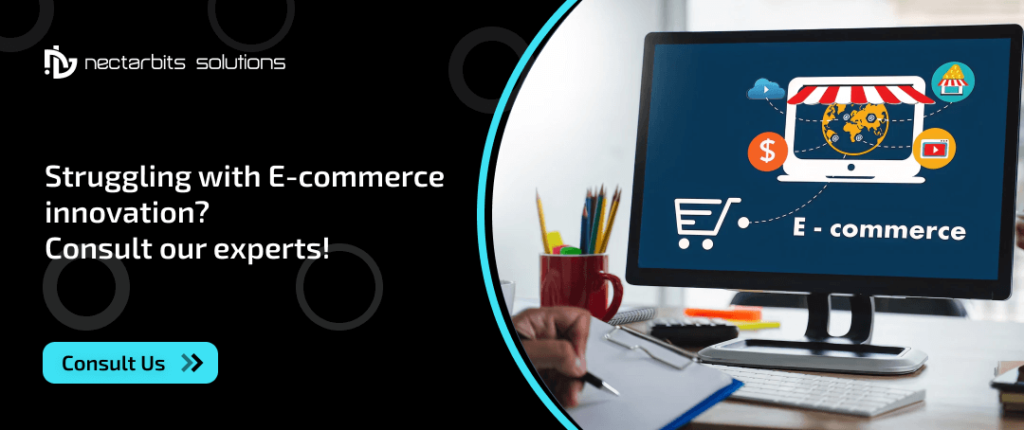Quick summary: Every business looking to join the Ecommerce race understands the importance of the e-commerce development approach. Custom e-commerce development vs. readymade ecommerce development based on certain factors helps businesses decide which fits their digital commerce needs well. Let’s explore!
The dynamic and rapidly expanding Ecommerce market is visible from Ecommerce sales growth that’s expected to increase to $7.886 trillion by 2028. It highlights the critical role of Ecommerce in global retail sales despite economic challenges. The user penetration will increase from 42.4% in 2025 to 49.1% by 2029, which indicates investing in e-commerce development is a lucrative deal.

However, everything is not so rosy. Regarding e-commerce development in Canada, businesses and entrepreneurs have two choices in moving ahead. They find themselves at the crossroads between custom E-commerce development and readymade e-commerce development solutions. The confusion complicates things, which is ironed out when they extensively understand the pros and cons of using each development approach.
The custom e-commerce development Vs. Readymade e-commerce development guide will help them make informed decisions based on their unique digital commerce needs. Let’s explore the differences to be on the right track.
Custom ecommerce vs. readymade e-commerce development- rarely known differences
The quick comparison between two development approaches- custom vs. readymade for E-commerce development in 2025 allows businesses to get a deeper overview of each approach and the differences that highlight which is better.
E-commerce development cost
Let’s accept it: budget is a primary concern for retailers looking to launch an Ecommerce store without breaking the bank. Custom E-commerce development requires huge investment upfront, encompassing hiring and paying developers, designers, QA engineers, and project managers, setting up infrastructure, and purchasing hardware/software licenses. There’s no fixed cost of custom ecommerce development, but discovery workshops conducted by leading e-commerce development companies will help prioritize the Ecommerce functionalities and design based on budget.
With a readymade ecommerce development approach, the initial development cost is lower as they are generally available with subscription services. The vendors provide the platform to launch ecommerce stores and pay monthly/annually for the plans selected. For example, Saas services from Clarro allow retailers to launch basic ecommerce stores and upgrade the plan in the future to access more functionalities.
Winner: Custom Ecommerce development is expensive as compared to readymade Ecommerce development.
Ecommerce development time
Ecommerce development time is proportional to the number of functionalities required, design complexity level, selected tech stack, and development team size. However, it’s a case with custom Ecommerce development where everything is done from scratch, which extends the development time. Building functionalities, crafting designs from the ground up, and testing them to fit business requirements is time-consuming.
Readymade Ecommerce development solutions provide pre-built templates that businesses can choose from and integrate the functionalities with simple plug-and-play with no technical knowledge required. This way, businesses can quickly set up, deploy, and get started selling online in less than 15 days.
Winner: Readymade Ecommerce solution takes less time to deploy than custom Ecommerce development.
Ecommerce customization degree
Ecommerce stores reflect the retail brand and act as a virtual storefront for the retailers. So, it must be tailored to the needs of the retail business. Custom Ecommerce development helps retailers gain an edge with tailored Ecommerce development based on business-specific needs. As custom Ecommerce is built from the scratch with end-users perspective, they increase customer retention and satisfaction with personalized experience delivery.
As readymade solutions are provided by third-party vendors who own and control the platform, thus businesses will have the right to customize the store to a certain extent. There are plenty of templates, but customization is not enough to allow businesses to carve a unique niche. Also, the vendor provides changes in functionalities, and you never know when they stop supporting the functionality or integration.
Winner: The Custom Ecommerce development approach provides more freedom to shape an ecommerce idea into a personalized ecommerce store than a readymade ecommerce solution.
Ecommerce scalability possibility
Building ecommerce smarter that accommodates business growth and changing needs is essential to outgrow and outperform. A custom ecommerce development approach allows businesses to adapt to the changing ecommerce trends, evolving customer expectations, and technological advancement. Also, it helps ecommerce stores improve functionalities, add new integrations, and accommodate growing user traffic with zero downtime or crashes.
On the contrary, scalability issues are experienced with readymade ecommerce development solutions as they are one-size-fits-all solutions for various types and sizes of businesses. They won’t allow you to add features your customers need. Besides, legacy system integration issues may require more time and resources. For performance glitches, the dependency on vendors is terrible, sometimes leading to customer dissatisfaction and loss of sales.
Winner: A custom ecommerce development approach is ideal for growing businesses where performance is the key to success.
Ecommerce security
E-commerce businesses store users’ sensitive data, which must be safeguarded to ensure users purchase from the same store. Custom ecommerce development ensures ecommerce shop is safe with continuous ongoing support and maintenance services. It includes performance monitoring and checks, compatibility with new technologies, and security updates so that no fraud can manipulate the Ecommerce store. The businesses own the source code and can check and improve it anytime, which enhances system security.
The off-the-shelf ecommerce solution is securely built, and security updates are regularly provided, ensuring vulnerabilities are kept at bay. Ecommerce businesses get a notification regarding security patches, which can be installed easily. However, businesses don’t have access to source code, and a single line of error can dent your ecommerce store’s security net.
Winner: custom ecommerce solutions are more secure.
Ecommerce experience delivery
Experience stays at the heart of Ecommerce sales because customers are ready to spend more for the best experiences. Custom ecommerce development solutions help businesses deliver exceptional, personalized experiences that turn visitors into potential customers. For example, virtual fitting rooms to try clothes virtually before buying them, intelligent recommendations that improve sales, dynamic pricing to balance supply and demand, marketing automation to increase outcomes, and AI voice assistants to enhance customer support.
There are limitations with off-the-shelf ecommerce solutions that help ecommerce solutions perform basic tasks such as product listing, checkout, marketing, and others. However, it’s not enough to engineer a personalized user experience that users expect the least.
Winner: Custom e-commerce development ensures a better experience of delivery with individualization.
Which is better- custom ecommerce vs. readymade ecommerce development?
Undoubtedly, choosing the right Ecommerce development approach helps businesses maximize the benefits of ecommerce development. Assessing business requirements, financial planning, identifying scalability needs, and finding customization needs allow businesses to choose the ecommerce development that meets their online marketplace needs.
Suppose you cannot identify which ecommerce development approach is the best bet to place. Consult the ecommerce development company consultants that guide business stakeholders for the best Ecommerce solution.

FAQs
1) Which development approach is more affordable- custom or readymade approach?
Readymade ecommerce development approach is more affordable with limited investment upfront. However, the hidden cost at a later stage makes ecommerce development expensive.
2) Which is a better option for performance?
Custom ecommerce websites are known for better performance tuning and SEO optimization, and businesses can make changes to optimize the store for improved SERP.
3) Can I customize a readymade ecommerce store?
Yes, businesses can customize the readymade ecommerce store, but only to a limited extent. For example, the platforms provide thousands of templates for customizing themes, plugins, and coding.
4) Which development option is better for long-term business growth?
Custom ecommerce development is a better option as it facilitates scalability, flexibility, robust security, and personalized experience, which is the least requirement for long-term business growth.
5) Can I switch from readymade ecommerce to a custom ecommerce solution?
This approach is employed by many retail businesses wherein they start the online journey with readymade ecommerce development and later migrate to custom ecommerce solutions. Still, it’s feasible only when data is properly backed up and exportable.




